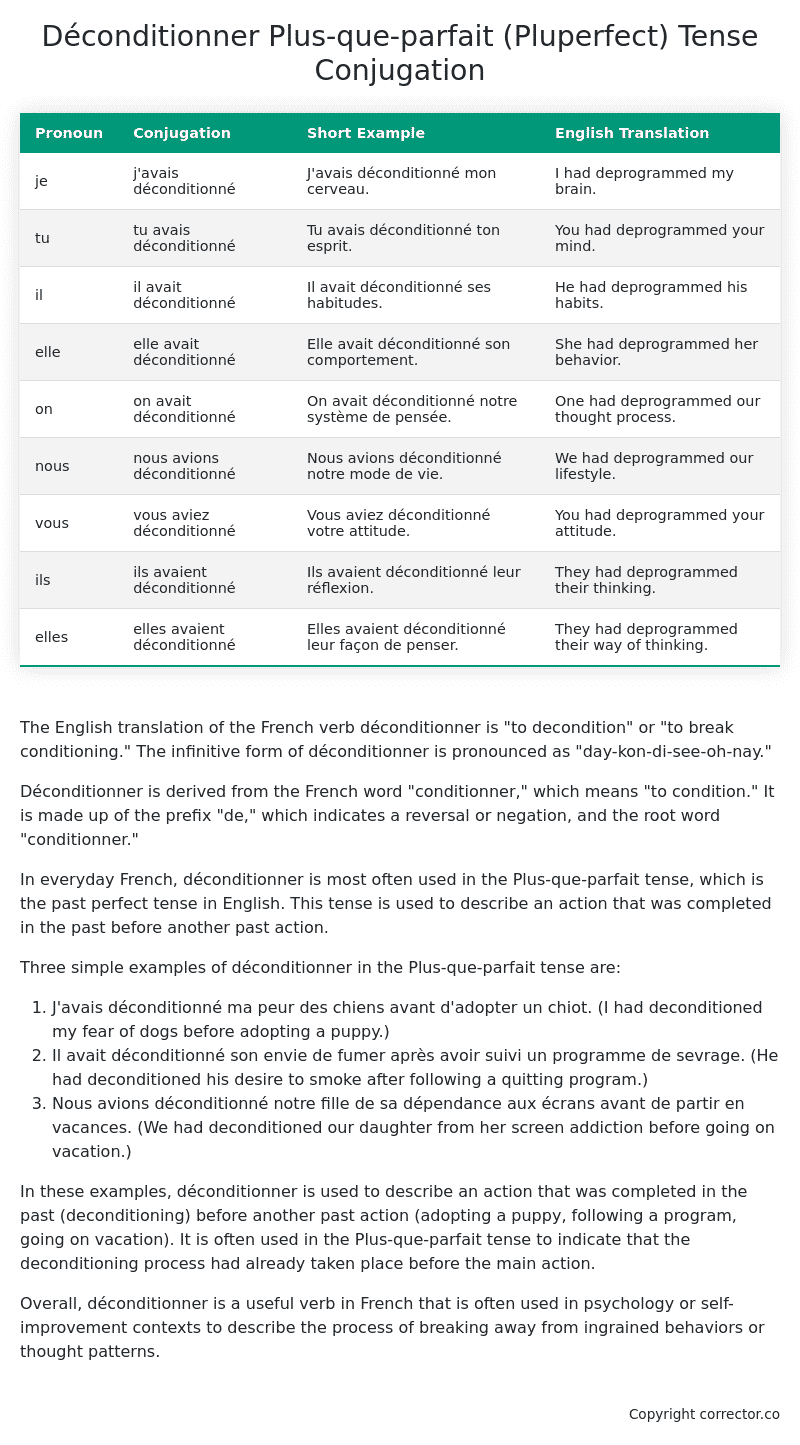Plus-que-parfait (Pluperfect) Tense Conjugation of the French Verb déconditionner
Introduction to the verb déconditionner
The English translation of the French verb déconditionner is “to decondition” or “to break conditioning.” The infinitive form of déconditionner is pronounced as “day-kon-di-see-oh-nay.”
Déconditionner is derived from the French word “conditionner,” which means “to condition.” It is made up of the prefix “de,” which indicates a reversal or negation, and the root word “conditionner.”
In everyday French, déconditionner is most often used in the Plus-que-parfait tense, which is the past perfect tense in English. This tense is used to describe an action that was completed in the past before another past action.
Three simple examples of déconditionner in the Plus-que-parfait tense are:
- J’avais déconditionné ma peur des chiens avant d’adopter un chiot. (I had deconditioned my fear of dogs before adopting a puppy.)
- Il avait déconditionné son envie de fumer après avoir suivi un programme de sevrage. (He had deconditioned his desire to smoke after following a quitting program.)
- Nous avions déconditionné notre fille de sa dépendance aux écrans avant de partir en vacances. (We had deconditioned our daughter from her screen addiction before going on vacation.)
In these examples, déconditionner is used to describe an action that was completed in the past (deconditioning) before another past action (adopting a puppy, following a program, going on vacation). It is often used in the Plus-que-parfait tense to indicate that the deconditioning process had already taken place before the main action.
Overall, déconditionner is a useful verb in French that is often used in psychology or self-improvement contexts to describe the process of breaking away from ingrained behaviors or thought patterns.
Table of the Plus-que-parfait (Pluperfect) Tense Conjugation of déconditionner
| Pronoun | Conjugation | Short Example | English Translation |
|---|---|---|---|
| je | j’avais déconditionné | J’avais déconditionné mon cerveau. | I had deprogrammed my brain. |
| tu | tu avais déconditionné | Tu avais déconditionné ton esprit. | You had deprogrammed your mind. |
| il | il avait déconditionné | Il avait déconditionné ses habitudes. | He had deprogrammed his habits. |
| elle | elle avait déconditionné | Elle avait déconditionné son comportement. | She had deprogrammed her behavior. |
| on | on avait déconditionné | On avait déconditionné notre système de pensée. | One had deprogrammed our thought process. |
| nous | nous avions déconditionné | Nous avions déconditionné notre mode de vie. | We had deprogrammed our lifestyle. |
| vous | vous aviez déconditionné | Vous aviez déconditionné votre attitude. | You had deprogrammed your attitude. |
| ils | ils avaient déconditionné | Ils avaient déconditionné leur réflexion. | They had deprogrammed their thinking. |
| elles | elles avaient déconditionné | Elles avaient déconditionné leur façon de penser. | They had deprogrammed their way of thinking. |
Other Conjugations for Déconditionner.
Le Present (Present Tense) Conjugation of the French Verb déconditionner
Imparfait (Imperfect) Tense Conjugation of the French Verb déconditionner
Passé Simple (Simple Past) Tense Conjugation of the French Verb déconditionner
Passé Composé (Present Perfect) Tense Conjugation of the French Verb déconditionner
Futur Simple (Simple Future) Tense Conjugation of the French Verb déconditionner
Futur Proche (Near Future) Tense Conjugation of the French Verb déconditionner
Plus-que-parfait (Pluperfect) Tense Conjugation of the French Verb déconditionner (this article)
Passé Antérieur (Past Anterior) Tense Conjugation of the French Verb déconditionner
Futur Antérieur (Future Anterior) Tense Conjugation of the French Verb déconditionner
Subjonctif Présent (Subjunctive Present) Tense Conjugation of the French Verb déconditionner
Subjonctif Passé (Subjunctive Past) Tense Conjugation of the French Verb déconditionner
Subjonctif Imparfait (Subjunctive Imperfect) Tense Conjugation of the French Verb déconditionner
Conditionnel Présent (Conditional Present) Tense Conjugation of the French Verb déconditionner
Conditionnel Passé (Conditional Past) Tense Conjugation of the French Verb déconditionner
L’impératif Présent (Imperative Present) Tense Conjugation of the French Verb déconditionner
L’infinitif Présent (Infinitive Present) Tense Conjugation of the French Verb déconditionner
Struggling with French verbs or the language in general? Why not use our free French Grammar Checker – no registration required!
Get a FREE Download Study Sheet of this Conjugation 🔥
Simply right click the image below, click “save image” and get your free reference for the déconditionner Plus-que-parfait tense conjugation!

Déconditionner – About the French Plus-que-parfait (Pluperfect) Tense
Tense Formation
Common everyday usage patterns
Sequencing of past events
Background information
Hypothetical or reported speech
Interactions with other tenses
Summary
I hope you enjoyed this article on the verb déconditionner. Still in a learning mood? Check out another TOTALLY random French verb conjugation!


